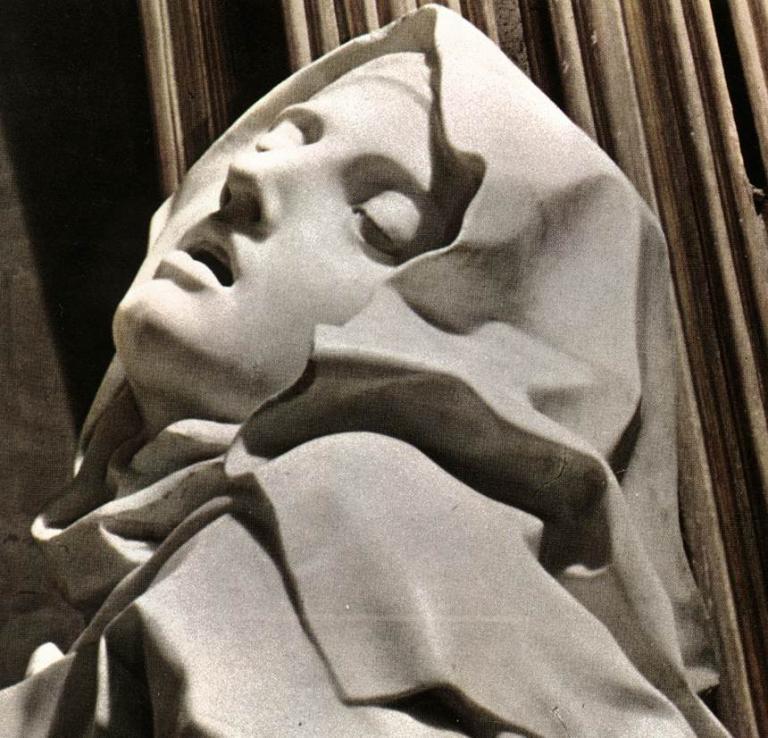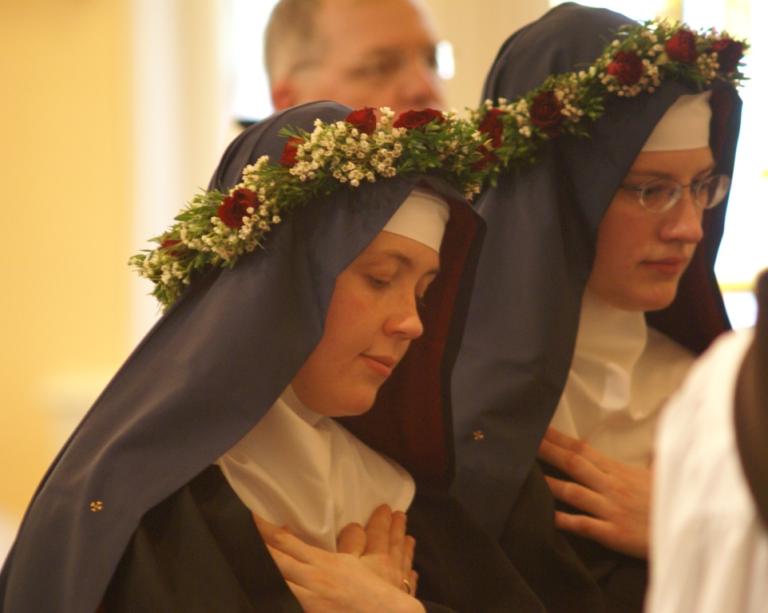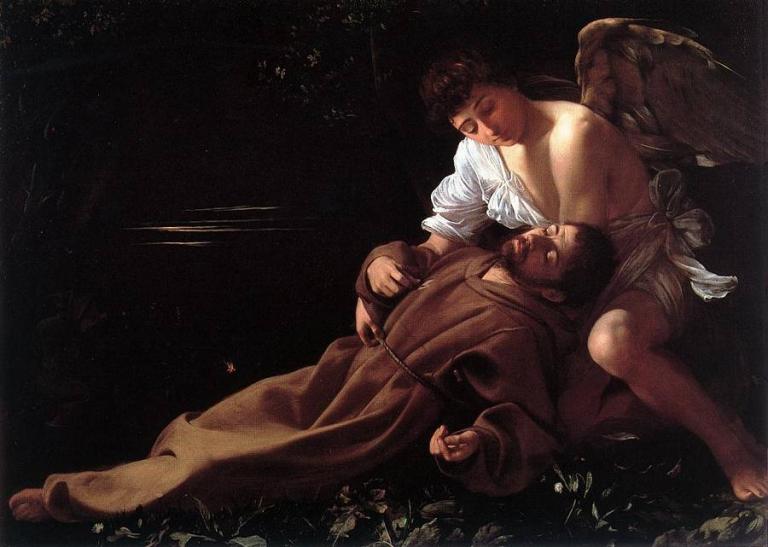This post will probably make a lot more sense if you read Is Female Purity Bullshit? and Is Purity Culture Sexist? first.
Virginity is sexual.
This is difficult to grasp in a post-Christian culture which lacks the social presence of nuns and religious sisters in daily life. We are educated to laud and await the day we’ll misplace our all-too-clingy virginity, making it impossible to imagine a beautiful woman freely and joyfully giving up everything she owns, shaving her head, taking up the simple cloth, making a vow of perpetual virginity, and speaking of it as the fulfillment of her being.
This is terrifying. Our culture of pornography, sexual-advertising, sexual “liberation,” and the definition of human beings as being their sexual desires (you, sir, are a Homosexual, and you, ma’am, a Sapiosexual, and you, a Bisexual-verging-Asexual, you, a Queer, a Questioning, perhaps a shade of Transgender, and you, God bless you for bravely claiming the title of Pansexual/Omnisexual, for it’s awful to deny who you are, your identity, which for me remains Heterosexual. Praise God, what marvelous, shimmering freedom we live in now that everyone has a label. (I can reduce and negate anyone! (Wait, where was I? Oh yes..))) this culture absolutely cannot allow a thing like consecrated virginity to be healthy, for virginity is a life of self-denial, not self-acceptance, and the idea that it may be true to the nature of a human person to deny their physical urges — well! Thus, in an effort to avoid the shocking fact that consecrated virgins walk happily among us, we dig canals alongside these mighty, roaring, rivers, diverting and diluting their essence into stereotypes we are comfortable with.
So for the stoic, intellectual 17-year-old on r/atheism, or the general denizen enjoying the fantastical freedoms of the sexual revolution, the chief thing is to render the nun pornographic. What’s needed to divert her obvious, indicting claim on virginity is photoshopped pictures of nuns-in-lingerie, the rather sexist sneer of a pornographic culture that must either associate the convent with the brothel — and thereby reduce the threat of that freely chosen innocence which stands in testimony against our particularly boring, addicted rottenness — or be lost.
For the more mature, academic dilettante of the sexual revolution — the mighty patron of Gender Theory’s most with-it textbooks — what’s needed is not so much Photoshop as Freud. This is the diversion of the virgin into predictable, clunking novels in which the protagonist nun, tired of her abbess and the hierarchy of the Catholic Church, frightfully abused by her vow of virginity (we are to forget that this vow was made in freedom, or better yet, to assume that such a vow could never be made in freedom), finds her self, claims her sexuality, comes-of-age, defeats the patriarchy, and breaks the hetero-normative cage , all in one mid-novel lesbian experience, culminating — if we’re lucky — in her subsequent persecution or — if we’re very lucky — her burning at the stake. These novels tend to have close ups of female eyes staring through a veil in such a way that speaks of the power of the human spirit to overcome the evils of institutional religion. Their titles use fonts one can only assume served as the headers for the stationary of the Spanish Inquisition, and usually contain the word “heretic,” meant to be read in a breathy tone of voice, as in, “oh, you naughty heretic,” and not “oh, you ignorant ass making a business out of intellectual dishonesty.” This is a sexually free culture. Virginity-as-happiness must be side-stepped.
For the more modest, unassuming Catholic who “knows his Church allows him to have his own opinions,” writes small letters to the editor of the Huffington Post regarding “the practicality of condom promotion” and “the sad reversal of the Catholic Church to a Ratzingerian mode of thinking,” and frowns upon the “positively medieval” emphasis on virginity in the Church — he gets extra points if he can say “positively medieval” more than once —his diversion of the blatant, yes-dammit-I-want-to-be-a-virgin claim of the religious sister is an “advocacy” for an end to celibacy amongst religious. Married priests, married nuns, that’s the way to move the Church forward into Somewhere Nice. Better yet, he dilutes the conception virginity by only supporting and gushing enthusiastically about nuns who do not wear the physical signs of chastity, the women of dying orders, which receive no new members. For if the nun is really a virgin — wink, wink, nudge, nudge — it is only the due to repressive, masculine imposition of dogma that weighs over their heads. Thus all attention and glory be to the LCWR, those nuns being so callously treated by the Vatican (that awful imposer of dogma) under investigation for failing to properly represent the Catholic Church they claim to represent, by who’s permission and authority they exist.
In each case — and there are many more — the only thing denied is the truth, that habited orders are exploding with beautiful, young women who long for a life of consecrated virginity as a positive good, not a repressive lack.
Our inability to take the nun at her word, to believe she means precisely what she says when she vows virginity before Eternity, and that she does so for precisely the reasons she says — because it is her vocation (her true self) — comes from our inability to think of virginity as anything but an absence of sexuality. It’s not. If the consecrated virgin represented an absence of sexuality, then there would be no need for “chastity” amidst the religious, which is defined as “the successful integration of sexuality within the person” (CCC 2337). Yet we find in The Catechism of the Catholic Church a quote of St. Ambrose’s as a guide:
There are three forms of the virtue of chastity: the first is that of spouses, the second that of widows, and the third that of virgins. We do not praise any one of them to the exclusion of the others…This is what makes for the richness of the discipline of the Church.” (CCC 2349)
“The chastity of virgins” only seems like an unnecessary tautology if we have in mind the virgin of our current “purity culture,” that is, the virgin defined by his or her lack of sex. The reason consecrated virgins must practice chastity is because true virginity is sexual, in that it directs the entire sexuality towards God. The language the Church uses to describe consecrated virgins is not the language of repression, but the language of marriage. In Consecrato Virginium — the Church’s rite for the consecration of virgins — the antiphon sings “I am espoused to him whom the angels serve; sun and moon stand in wonder at his glory.” Men and women who consecrate their virginity to God become a sign of fertile marriage, a signum transcendens amoris Ecclesiae erga Christum (a surpassing sign of the Church’s love for Christ) and an imago eschatologica Sponsae caelestis vitaeque futurae (an eschatological image of the heavenly bride and of the world to come). The nun and the sister are brides of Christ. They do not forsake the erotic when their don their wedding veils, they direct it towards God.
that is, the virgin defined by his or her lack of sex. The reason consecrated virgins must practice chastity is because true virginity is sexual, in that it directs the entire sexuality towards God. The language the Church uses to describe consecrated virgins is not the language of repression, but the language of marriage. In Consecrato Virginium — the Church’s rite for the consecration of virgins — the antiphon sings “I am espoused to him whom the angels serve; sun and moon stand in wonder at his glory.” Men and women who consecrate their virginity to God become a sign of fertile marriage, a signum transcendens amoris Ecclesiae erga Christum (a surpassing sign of the Church’s love for Christ) and an imago eschatologica Sponsae caelestis vitaeque futurae (an eschatological image of the heavenly bride and of the world to come). The nun and the sister are brides of Christ. They do not forsake the erotic when their don their wedding veils, they direct it towards God.
For our age — unsure whether to say “ew sex” or to have sex with all the things, all the time — this can only be awkward. The ecstasies, the contemplations of prayer that lead to the faces of pleasure-pain, the dizzying visions, the stigmata, the babble of tongues — if virginity is a lack, these miracles can only be explained as a recurring phenomena of a repressed sexuality. But if virginity is a sexuality-for-God, and an undivided dive into the heart of erotic love — God Himself — who loves with what Pope Emeritus Benedict XVI explains “may certainly be called eros [erotic love], yet it is also totally agape [unconditional love],” then we’re looking at something entirely different. The fact that the convent is a crucible of ecstatic miracles makes total sense if virginity is, in its fullness, nuptials with God. And this is true of both man and woman. What force but the erotic could have lifted St. Thomas Aquinas into the air?
How could the newly-lived virginity of St. Augustine have him crying, with all the force of the erotic, that, “Thou didst breathe fragrant odors and I drew in my breath; and now I pant for thee. I tasted, and now I hunger and thirst. Thou didst touch me, and I burned for thy peace,” unless it was an embrace of sexuality? What power could have wrung St. Francis into ecstasy, if not that of erotic love?
Oh, but I assume too much. Of course these events are only fairy-tales. (But I wonder whether it is really so foolish to believe in them. After all, lovers who experience the joy of erotic love quite naturally promise to love “forever,” a bizarre promise, given there is no proof of “forever” being even remotely possible. Perhaps they are simply mistaken. Perhaps they are lying for poetic effect. Or perhaps lovers, in their expression of erotic love, have tasted the Eternal, which demands they use infinite terms like “forever and always.” This suggests that the ecstasy of the Saint — so erotic in its expression — is simply a more direct path to the Eternity lovers experience in each other, namely, a path to Eternity itself. Consecrated virgins do not give up on sexuality, they actually live a form of sexuality aimed at the Eternal present in all erotic love, which — apparently — enables them to fly. (This is not, of course, to say that those who are not consecrated virgins cannot be pulled into levitation or falcon-punched into ecstasy.)
By way of the habited among us, we understand that virginity is not a lack, but is essentially sexual in nature, a virginity-for and full of the pull of erotic love. If “purity culture” is to be redeemed, it must destroy the idea that purity is an absence, and take up the emblem of purity-as-consecration, an orientation of the sexuality towards Eternity, not a repression of the sexuality until Mr. Right comes along. Consecrated virgins provide an example of virginity as a solid something. Their purity is thick as bread, and their chastity is far more substantial than the bravest of our pornographic escapades. Invite them over for dinner sometime.














